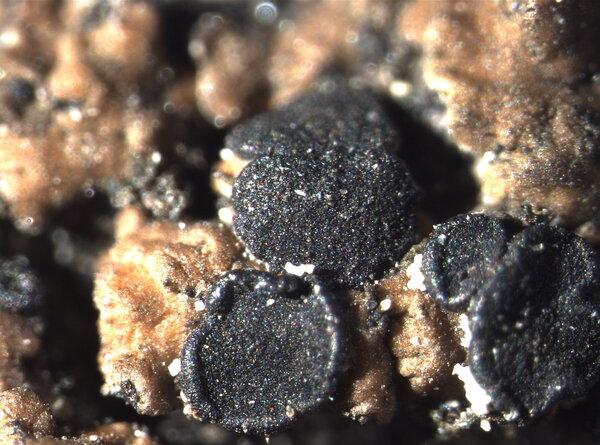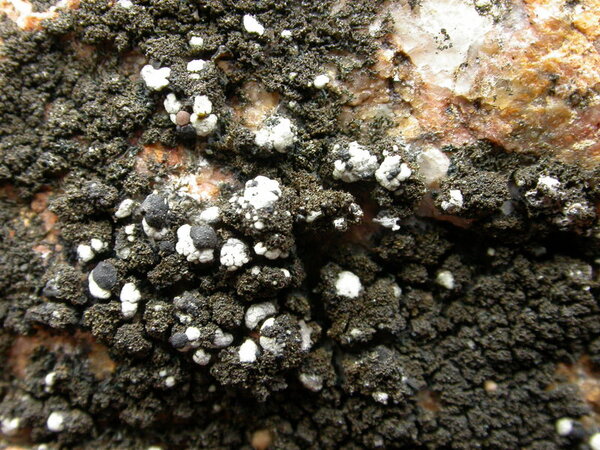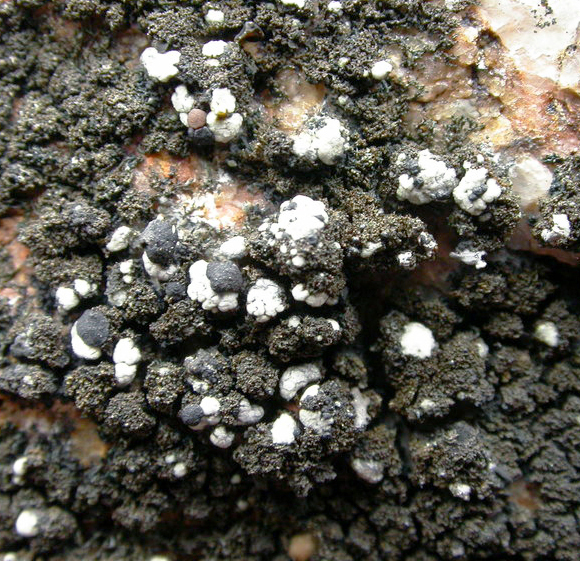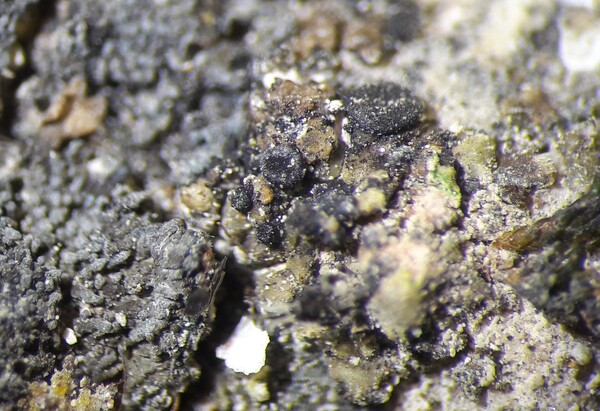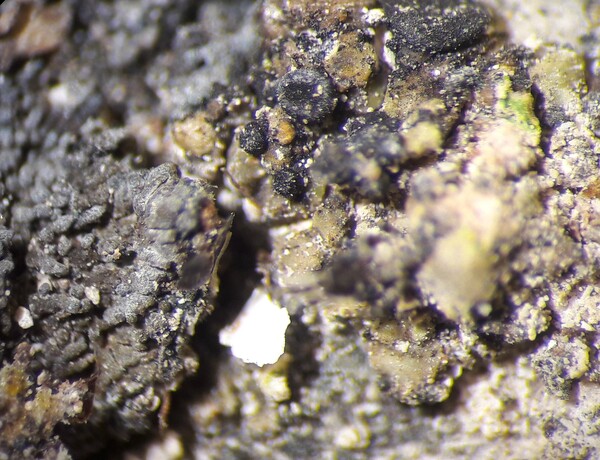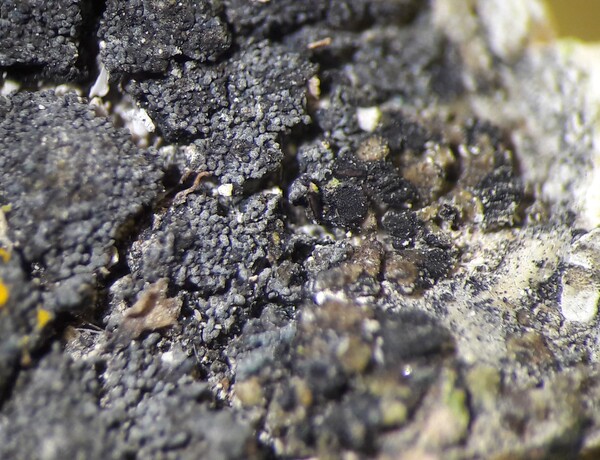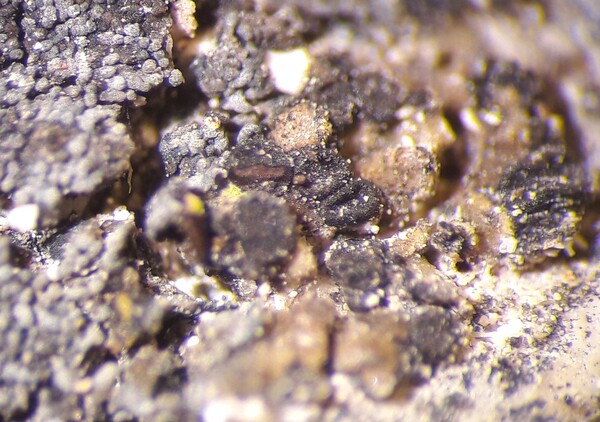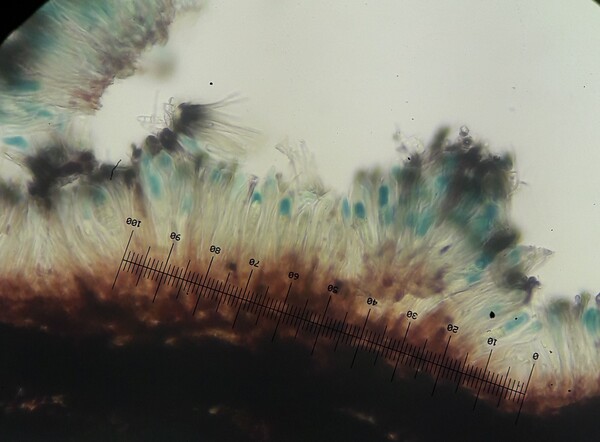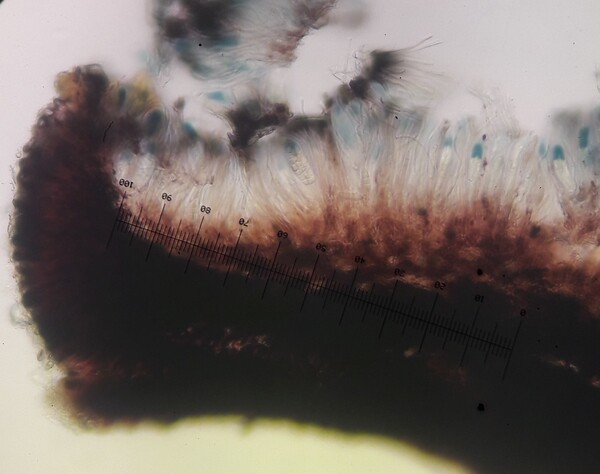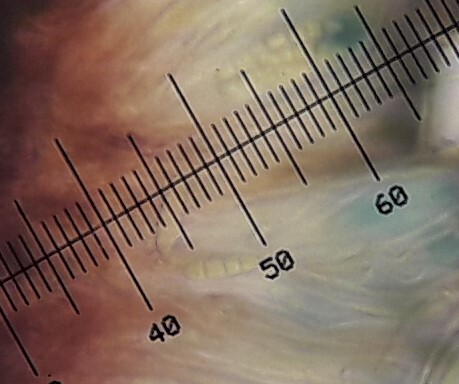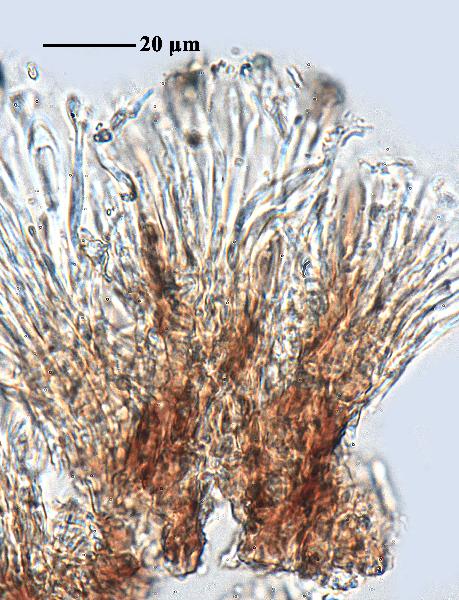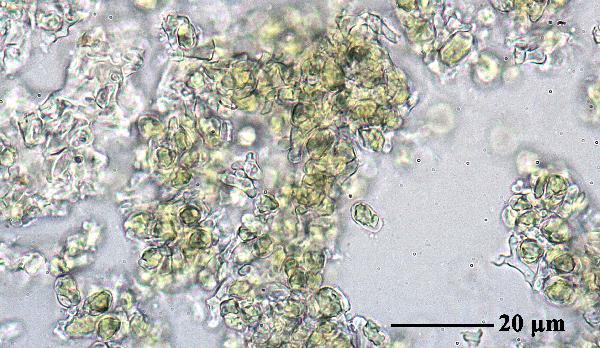Toniniopsis verrucarioides (Nyl.) Kistenich, Timdal, Bendiksby & S. Ekman
Taxon, 676: 898, 2018.. Basionym: Lecidea aromatica var. verrucarioides Nyl. - Bot. Not.: 157, 1853.
Synonyms: Bilimbia carbonacea (Anzi) Jatta; Lecidea subimbricata Nyl.; Lecidea verrucarioides Nyl.; Thalloidima boissieri Müll. Arg.; Toninia aromatica var. cervina (Lönnr.) Th. Fr.; Toninia boissieri (Müll. Arg.) Arnold; Toninia carbonacea Anzi; Toninia cervina Lönnr.; Toninia congesta Hepp ex Kremp.; Toninia conjungens Th. Fr.; Toninia kolax Poelt; Toninia subimbricata (Nyl.) H. Olivier; Toninia verrucarioides (Nyl.) Timdal
Description: Thallus squamulose, forming small, up to 1.5 cm wide patches, dark brown to dark grey, rarely weakly white-pruinose, never white-maculate, the squamules scattered to partly imbricate, round to elongated, often crenulate, slightly convex, up to 2 mm wide. Upper cortex 50-120 μm thick, with an up to 70 μm thick epinecral layer; algal layer continuous; medulla white, lacking crystals. Apothecia frequent, lecideine, sessile, up to 1 mm across, black, epruinose or faintly pruinose, usually persistently flat and marginate. Proper exciple dark reddish brown, K-, N-; epithecium dark brown, sometimes with a faint green tinge, K-, N- or (green pigment) N+ faintly violet, lacking crystals; hymenium colourless, 60-80 μm high; paraphyses not conglutinated, simple or sparingly branched and anastomosing in upper part, thin-walled, the apical cell distinctly swollen and covered by a gelatinous pigment cap; hypothecium dark reddish brown. Asci 8-spored, clavate, surrounded by a gelatinous I+ blue coat, with a well-developed I+ blue tholus, a I+ darker blue tube and a well-developed ocular chamber, Bacidia-type. Ascospores (1-)3-septate, hyaline, ellipsoid to bacilliform, 10-19 x 3.5-5 μm. Photobiont chlorococcoid. Spot tests: thallus K-, C-, KC-, P-, UV-. Chemistry: thallus without lichen substances.
Growth form: Squamulose
Substrata: rocks
Photobiont: green algae other than Trentepohlia
Reproductive strategy: mainly sexual
paras Placynthium
Commonnes-rarity: (info)
Alpine belt: extremely rare
Subalpine belt: very rare
Montane belt: extremely rare
Dry submediterranean belt: absent
Humid submediterranean belt: absent
Padanian area: absent
pH of the substrata:
1 2 3 4 5
Solar irradiation:
1 2 3 4 5
Aridity:
1 2 3 4 5
Eutrophication:
1 2 3 4 5
Poleotolerance:
0 1 2 3
Altitudinal distribution:
1 2 3 4 5 6
Rarity
absent
extremely rare
very rare
rare
rather rare
rather common
common
very common
extremely common
Loading data...
Occurrence data
Predictive map
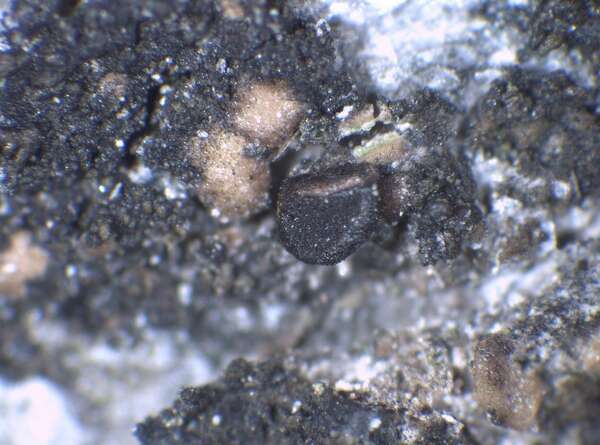
P.L. Nimis; Owner: Department of Life Sciences, University of Trieste
Herbarium: TSB (33570)
2003/03/06
on Placynthium nigrum
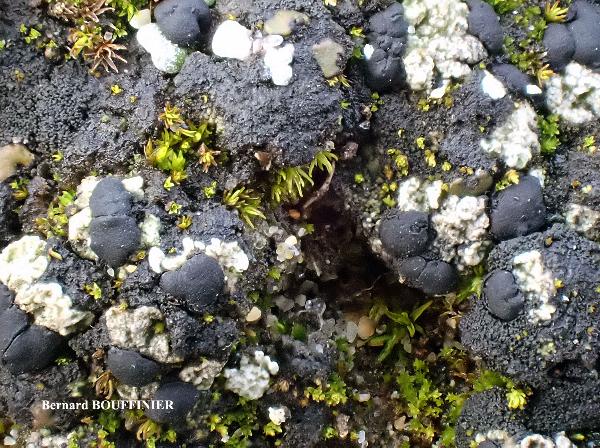
Bernard Bouffinier - Source: http://www.lichensmaritimes.org/index.php?task=fiche&lichen=1149&lang=en
France, La Palue
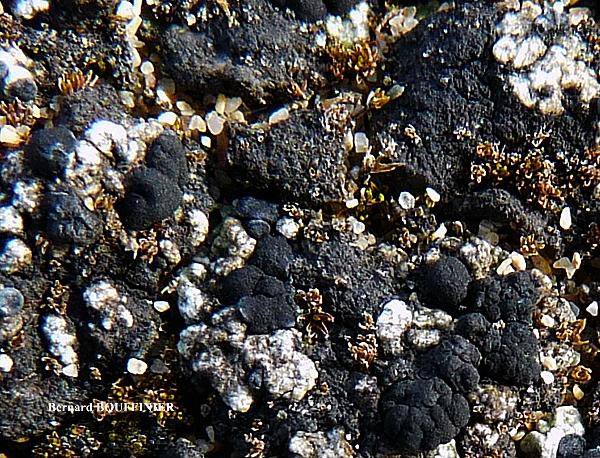
Bernard Bouffinier - Source: http://www.lichensmaritimes.org/index.php?task=fiche&lichen=1149&lang=en
France, La Palue
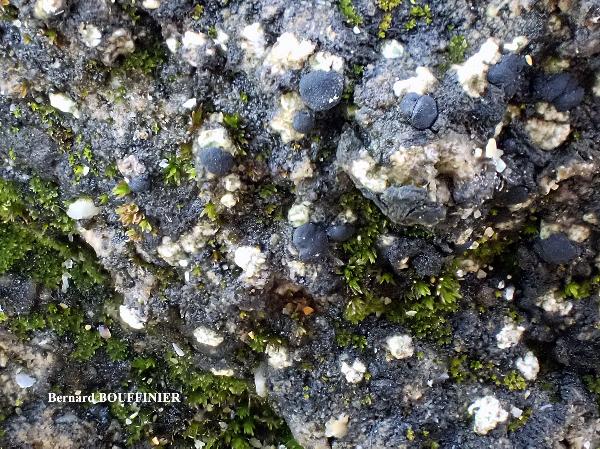
Bernard Bouffinier - Source: http://www.lichensmaritimes.org/index.php?task=fiche&lichen=1149&lang=en
France, La Palue
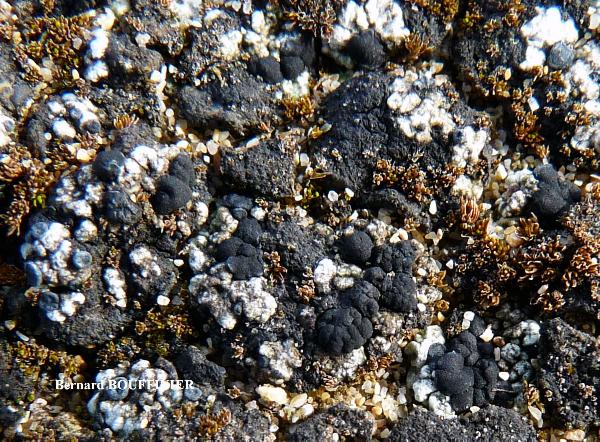
Bernard Bouffinier - Source: http://www.lichensmaritimes.org/index.php?task=fiche&lichen=1149&lang=en
France, La Palue
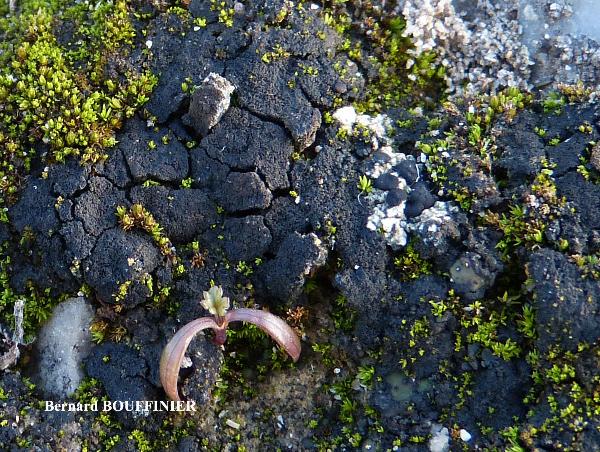
Bernard Bouffinier - Source: http://www.lichensmaritimes.org/index.php?task=fiche&lichen=1149&lang=en
France, La Palue
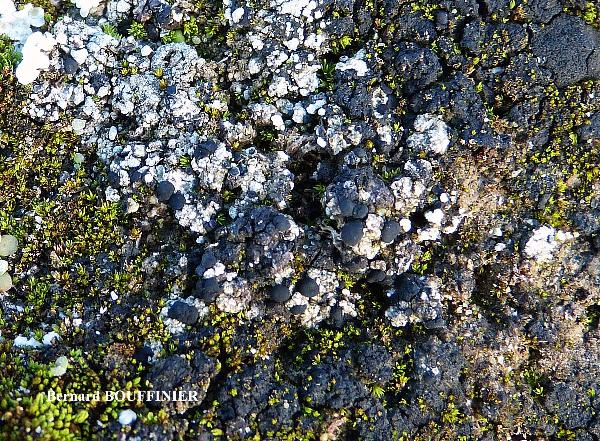
Bernard Bouffinier - Source: http://www.lichensmaritimes.org/index.php?task=fiche&lichen=1149&lang=en
France, La Palue
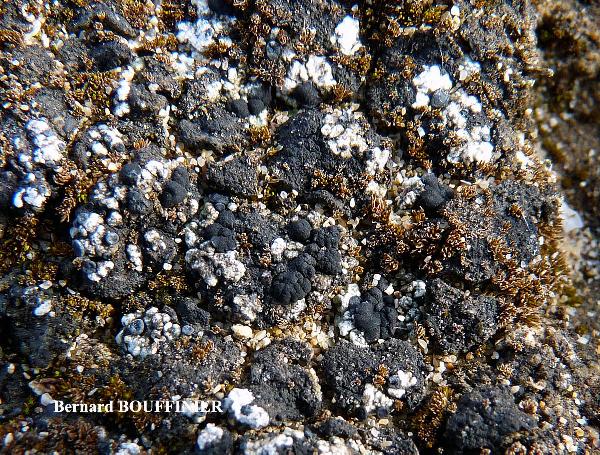
Bernard Bouffinier - Source: http://www.lichensmaritimes.org/index.php?task=fiche&lichen=1149&lang=en
France, La Palue
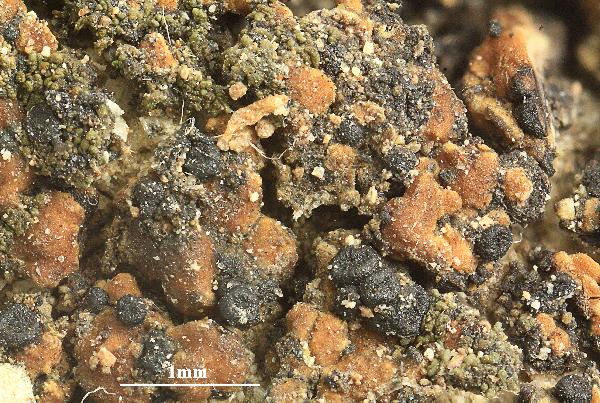
Felix Schumm - CC BY 4.0
[ABL7398], Germany, Eifel, Gerolstein, Auberg. Leg. A. Aptroot,
19.10.1977. - On Placynthium nigrum. Epihymenium black, paraphyse
tips clavate, hypothecium redbrown. Spores 8/ascus, 3-septate, colourless,
15-18 x 3-4 μm.
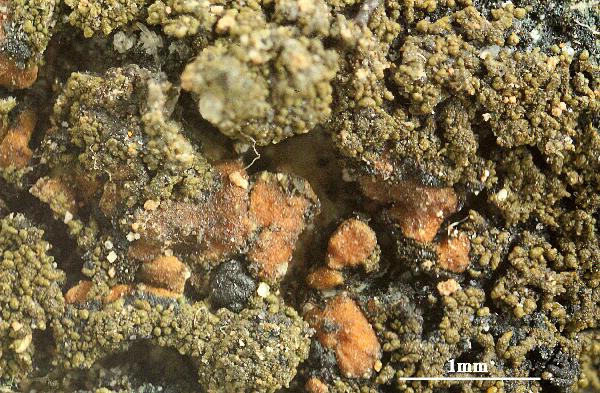
Felix Schumm - CC BY 4.0
[ABL7398], Germany, Eifel, Gerolstein, Auberg. Leg. A. Aptroot,
19.10.1977. - On Placynthium nigrum. Epihymenium black, paraphyse
tips clavate, hypothecium redbrown. Spores 8/ascus, 3-septate, colourless,
15-18 x 3-4 μm.
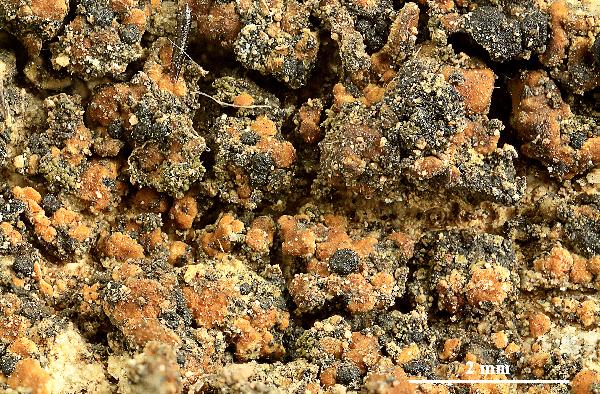
Felix Schumm - CC BY 4.0
[ABL7398], Germany, Eifel, Gerolstein, Auberg. Leg. A. Aptroot,
19.10.1977. - On Placynthium nigrum. Epihymenium black, paraphyse
tips clavate, hypothecium redbrown. Spores 8/ascus, 3-septate, colourless,
15-18 x 3-4 μm.
Growth form: Squamulose
Substrata: rocks
Photobiont: green algae other than Trentepohlia
Reproductive strategy: mainly sexual
paras Placynthium
Commonnes-rarity: (info)
Alpine belt: extremely rare
Subalpine belt: very rare
Montane belt: extremely rare
Dry submediterranean belt: absent
Humid submediterranean belt: absent
Padanian area: absent
pH of the substrata:
| 1 | 2 | 3 | 4 | 5 |
Solar irradiation:
| 1 | 2 | 3 | 4 | 5 |
Aridity:
| 1 | 2 | 3 | 4 | 5 |
Eutrophication:
| 1 | 2 | 3 | 4 | 5 |
Poleotolerance:
| 0 | 1 | 2 | 3 |
Altitudinal distribution:
| 1 | 2 | 3 | 4 | 5 | 6 |
Rarity
absent
extremely rare
very rare
rare
rather rare
rather common
common
very common
extremely common
Loading data...
Occurrence data
Predictive map

P.L. Nimis; Owner: Department of Life Sciences, University of Trieste
Herbarium: TSB (33570)
2003/03/06
on Placynthium nigrum

Bernard Bouffinier - Source: http://www.lichensmaritimes.org/index.php?task=fiche&lichen=1149&lang=en
France, La Palue

Bernard Bouffinier - Source: http://www.lichensmaritimes.org/index.php?task=fiche&lichen=1149&lang=en
France, La Palue

Bernard Bouffinier - Source: http://www.lichensmaritimes.org/index.php?task=fiche&lichen=1149&lang=en
France, La Palue

Bernard Bouffinier - Source: http://www.lichensmaritimes.org/index.php?task=fiche&lichen=1149&lang=en
France, La Palue

Bernard Bouffinier - Source: http://www.lichensmaritimes.org/index.php?task=fiche&lichen=1149&lang=en
France, La Palue

Bernard Bouffinier - Source: http://www.lichensmaritimes.org/index.php?task=fiche&lichen=1149&lang=en
France, La Palue

Bernard Bouffinier - Source: http://www.lichensmaritimes.org/index.php?task=fiche&lichen=1149&lang=en
France, La Palue

Felix Schumm - CC BY 4.0
[ABL7398], Germany, Eifel, Gerolstein, Auberg. Leg. A. Aptroot, 19.10.1977. - On Placynthium nigrum. Epihymenium black, paraphyse tips clavate, hypothecium redbrown. Spores 8/ascus, 3-septate, colourless, 15-18 x 3-4 μm.

Felix Schumm - CC BY 4.0
[ABL7398], Germany, Eifel, Gerolstein, Auberg. Leg. A. Aptroot, 19.10.1977. - On Placynthium nigrum. Epihymenium black, paraphyse tips clavate, hypothecium redbrown. Spores 8/ascus, 3-septate, colourless, 15-18 x 3-4 μm.



